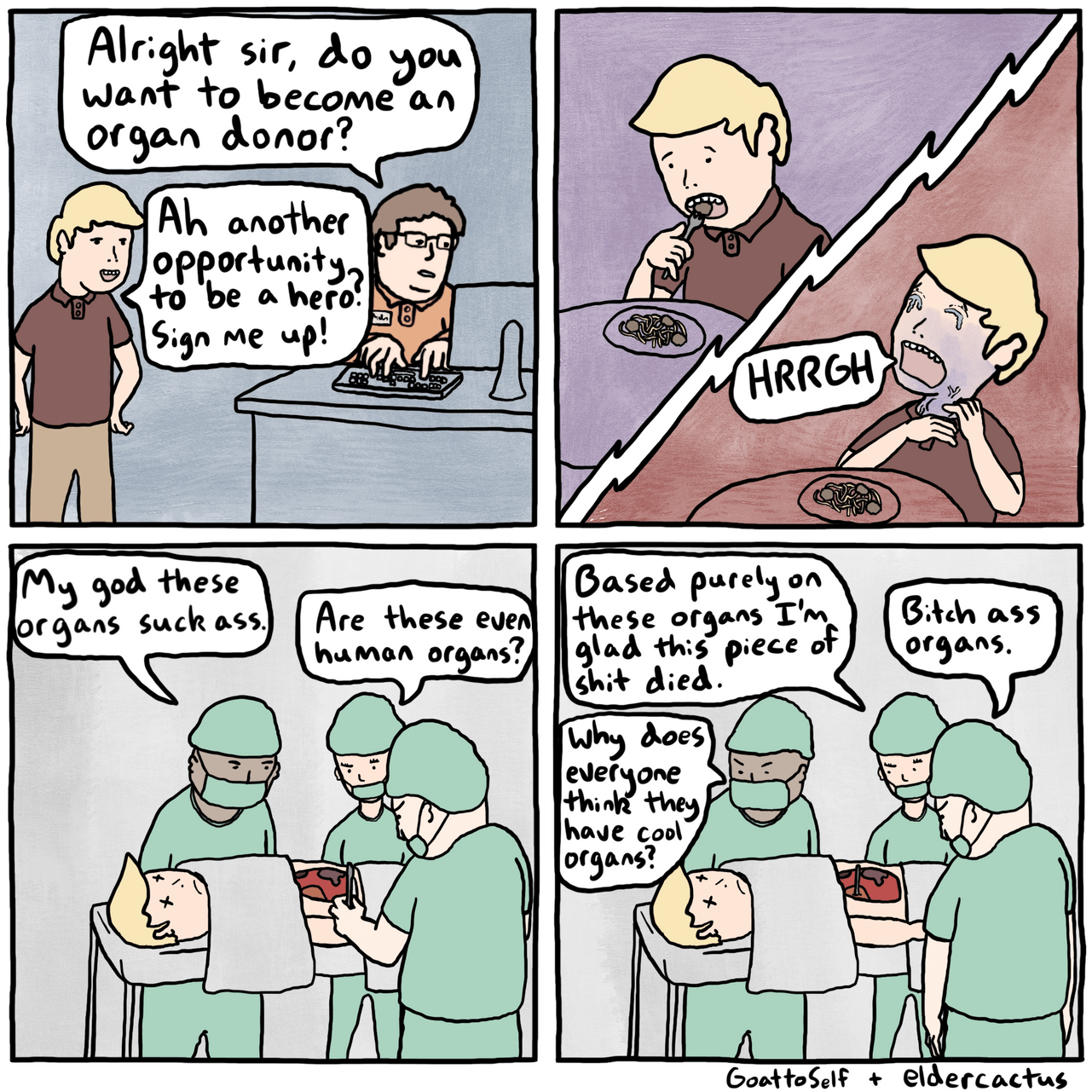Healthcare in the US is run for profit. From 2020 estimates, they charge $1.6 million for a heart transplant. $1.3 million to transplant a pair of lungs, $880 thousand for a liver, and $440 thousand for a kidney. This is what for profit hospitals charge patients while giving your next of kin nothing for the organs that made it possible.
They don’t pay you for your organs. They will still bill your estate for any care other than the organ removal despite your generosity.
I would happily be an organ donor in a country with a non-profit healthcare system. But because of how heathcare is run in this country, I would rather my organs be left to rot.
I agree it’s horrible, but also I don’t see it as a large enough reason to not donate. The person receiving the organs is probably not the cause of this. It’s like not working because your labor mostly goes to the elites. It’s not a great plan, even if it does feel good.
I like the system in Singapore. Organ donation is mandatory, though you can complete a form to opt out. If you’re on the opt-out register, you have a lower priority to receive organ transplants. Fair is fair.
I am - in the UK - and I think that it should be opt out rather than opt in.
It is, they changed it a while back.
I’d go so far as to say there should be no choice available to opt out
I think the vast majority of people who, even if they have some discomfort around the idea, would not care enough to opt out. The only effect of not allowing opt out, I think, would be to cause considerable distress to those who do care a lot about not donating. I don’t agree with their stance but I don’t think they should be forced to donate, especially if we can get enough organs just from making it opt out instead of opt in
Wtf? The state doesn’t own our bodies.
Neither do you, once you’re dead.
How does it matter though once we’re dead? It’s only gonna help others in need
Just so everyone knows, you can’t really transplant dead organs (at least not as safely or with the success of live organs).
They can only use your organs if you die in a hospital setting. They will keep pumping blood to your organs after you die to keep them “fresh” and “alive.”
Post-death organ transfer exists but is way more risky than an organ that was recently in a living, functioning body.
So if you’ve ever considered it, keep in mind that you have to die at a hospital for it to happen, and even then, they’re still technically forcing your body to be alive to keep these organs alive.
Source: Friend who lost his leg to amputation during a COVID-coma. They didn’t think he would make it. He woke up in the donor ward. EDIT: Just to be clear, this happened during peak COVID before the vaccines when bodies were just piling up everywhere. I don’t think a coma patient waking up in the donor ward is a normal thing, I think it happened because COVID was a fucked up situation and people were overwhelmed.
I worked as a transplant coordinator for a few years, and you’re mostly right, but there qre a few points I would clarify.
Dead is dead. All transplants are post death.
All of your organs need oxygen to keep functioning. When they don’t have oxygen, the cells die and the organ stops working, but you can be dead and have functioning organs.
When your brain is deprived of oxygen, the neurons stop firing and you’re gone. Dead is the irreversible cessation of brain activity. Sometimes organs can heal, but once your brain is gone, you’re dead.
Sometimes that happens because your heart stops beating. The muscle in your heart can also die, and it will stop pumping blood. This heart failure deprives your brain of blood, and then you die. When your heart is failing, you can stimulate the heart to keep beating and continue to live. But if your heart stops beating and you die, that is called a cardiovascular death.
You may also lose oxygen due to a failure of the lungs. Lungs put oxygen in your blood, and if your lungs fail, you don’t get oxygen to your brain and you die. This could be related to the lungs, the vasculature between the heart and lungs, or any combination of the three.
The liver and the kidneys work to filter the blood. If either of these fail, your blood can become toxic and poison your heart, your lungs, and/or your brain. The liver and kidneys also need oxygen to live, so if your heart stops beating or your lungs stop providing oxygen, then they will begin to die at the same time as your heart.
Like your organs, your muscles, skin, and nerves also need oxygen to live, and if you have trouble getting oxygen to your peripheral systems, your limbs can begin to die and become necrotic. Necrotic tissue creates a feedback loop of decay in your blood stream, and often requires amputation.
Covid affects both the lungs and the heart. Lung damage reduces oxygen in the blood, and heart failure reduces the flow of blood to the extremities.
Now, in the event of a traumatic brain injury, like a motorcycle accident, the brain can be killed before the other organs begin to die. The heart has a special mechanism that allows it to continue beating without input from the brain. These are ideal circumstances for organ donation, because the donor has died but their transplantable organs are in good condition.
It might be different in other countries, but in the USA, there is a network of transplant professionals that work together to procure and distribute transplants. They work with the hospitals to identify potential donors and talk to the families about donation options.
The hospital would call the local organ procurement organization every time any patient had a traumatic brain injury, even before they died. Patients would continue to receive treatment in the same area of the hospital by the same doctors and nurses. There is no “donor ward” and the only difference in treatment is that additional efforts will be made to keep the transplantable organs alive.
The patient’s doctor wants to keep their brain alive along with everything else, and they only stop trying when it becomes impossible to succeed.
So, while I’m sure that your friend really did experience the loss of a limb, and I’m certain the OPO had dispatched a transplant coordinator to evaluate your friend for donation, there’s no way the family was approached for possible donation without a dire prognosis (or maybe they asked). The approach would have been in the same conversation where they discuss withdrawing care because there is no hope.
The doctors and the family may have mentioned that they had discussed donation to demonstrate how dire the situation seemed, and how close to death your friend was, but they would not have altered his care at all or moved him to a special section for donors.
Sorry to hear about your friend.
I don’t think knowing this fact should discourage anyone from choosing to be a donor, though. It just means that yeah, it’s unlikely that you’ll be in a position where they can use your organs when you die, but it doesn’t hurt to be put on the list just in case.
Iirc, I think a lot of organ donations end up being from people in motor vehicle accidents.
I did get to see one case where they harvested the person’s bones instead of their organs. Didn’t even know that was a thing. I’m not sure if they died in a hospital setting or not. Might be you get more time to harvest bones as opposed to organs?
Oh yeah, I hope I don’t dissuade anyone. I just hadn’t ever really deeply thought about it before, despite being a registered organ donor. It’s an interesting conundrum to me, because you need fresh, live organs, but you can’t reasonably take those from fresh, live people most of the time, so you need people who are literally on death’s door, who aren’t going to make it, to have their bodies kept artificially alive for the purpose of organ transfer. COVID was just a fucked up situation all around with not enough beds and so many people dying. My friend had a rough experience, but it’s hardly the norm.
Yeah I’m so glad that we’re not still in that disaster. I mean, I know COVID is still out there, but thankfully in much smaller numbers and we have a much greater capacity to treat it nowadays… especially without hospitals being overwhelmed.
I’ve seen cases where patients actually ended up getting lung transplants in an attempt to save them with COVID. I handled the diseased lungs and they were so bizarre looking.
Wow, I didn’t know about the covid lung transplants. If you don’t mind me asking, could you describe the covid lungs/how they looked different to healthy lungs? Just morbidly curious
Sure thing. It’s been a while and I’ve only seen a few, but I’ll do my best.
So normal lungs are puffy enough, and smooth and glistening on the outside. On the inside, they resemble a kitchen sponge. They are soft and pliable, and able to easily contract and expand to inhale and exhale air.
In these COVID lungs, the outside was very ragged and shaggy. They were distorted with a lot of contracted areas. When you cut into it, there was some residual spongy areas, but a lot of it was white, firm, and solid. Think of how you might get a gnarly scar on your arm from a bit cut. Except instead of just being a single scar, almost the entirely of the lungs are scarred and firm. They aren’t able to contract and expand easily anymore because of how firm and rigid they’ve become. And because they no longer have the spongy architecture, it means many of the airspaces are lost and there is far less areas for potential gas exchange.
So I’m not positive, but I’m fairly sure these COVID lung transplant attempts are primarily performed on younger patients after their body was able to clear the virus. It’s just that in these individuals, although they no longer had COVID, the resulting scar tissue absolutely destroyed their lungs. It doesn’t happen in every case thankfully…or even most cases, but when it does it’s a bit scary.
I remember one of my cases being a young pregnant woman who had to be put on an ECMO machine (artificially oxygenates the blood when your heart and/or lungs cannot). I don’t know whatever came of her, but I hoped she was able to go on and lead a relatively normal life.
You can read a bit more about this sort of thing here: https://en.wikipedia.org/wiki/Interstitial_lung_disease
Wow, that was really interesting. Thanks for typing that up
No problem. I get to see some nat things from time to time.
What does it even look like when you wake up in a donor ward? Was he a write-off and the doctors were just like ‘oh shit, he’s awake’? Do non-donors simply get disposed of instead of being brought there?
He’s older and it’s been tough to get explicit details from him, but yeah it sounds like because it was during COVID and beds for bodies were so scarce, on top of the fact that they didn’t have high hopes for him surviving (so many people his age with COVID just never made it), that they were keeping in there for simplicity’s sake. Anyway, it spurred me to begin looking into organ donation actually functions, and I mean, it makes sense, I just hadn’t really thought about it before that you technically have to have your body being kept alive to be able to donate the organs. A rotting organ probably isn’t very useful. That’s why it usually happens with terminal patients where the outcome is 100% they are gonna die. During COVID, with bodies piling up, and lack of open beds in hospitals, it at least makes sense to me that he would have ended up there, in case he didn’t wake up. It was pandemonium, at the time. Sadly, it seems to have kind of messed with his head to wake up in that situation, he’s a lot less trustful of doctors now.
If I’d walk up from coma with one leg less, I might lose my trust in doctors too…
It’s not the leg amputation, I believe, they considered him “as good as dead” when he went into coma. He knew he was getting an amputation. What he didn’t expect was that he would wake up to a nightmare of being prepped for his other organs to be removed.
Damn that is a nightmare. That’s not just trust issues, that’s a legitimate traumatic event. That is trauma.
Thankfully it’s opt-out in Slovakia, so yes.
I’ll be dead. Do whatever with my body. Take the organs, fuck it, feed it to animals, compost it, use it as shooting target, turn me into soap, I won’t care. I literally won’t be able to care. Why even decline?
id personally be ok if people didn’t use my dead body as a shooting target. soap would be pretty nice tho.
I am not registered, but I have a organ donor card (where I approve organ donations).
Background:
Germany just recently (18th of March this year) launched an online database where you can register your preference. Until then there was only a small organ donor card that you could fill out and carry with you.
Reason I haven’t registered there yet is that I first need to unlock the online function on my passport (nowadays always enabled, but I still have one from when it was optional). So I’ll eventually get around to doing both.
As for my reasoning behind being a donor:
-
I would like to receive them in an emergency (or for someone I care about to do so).
-
And in case I become a donor I am not there anymore to care about what people do with my organs.
-
Yes, definitely.
I received a live donor kidney transplant over a decade ago, and because of that, my quality of life drastically improved, and I lived long enough to meet my kid and my nieces and nephews.
I’ve got complex medical issues, so my organs might not be any good, but they’re going to be available when I’m gone.
Only because there’s no box on the license application that says “donate body to be chummed and thrown on rich people”.
But for real if my vacated body can save someone else’s life or make it better by all means get that shit.
Yeah but I wasn’t for a long time. There was a spiderman cartoon where mary jane was targeted for murder because her name was in a database of organ donors and the villain needed her organs for his wife or something. scared the shit out of me when I was a kid and I had a knee jerk reaction when filling out the form I never really thought about. someone had to directly ask me before I realized I had based this decision on a cartoon I saw when I was 5.
What a message to give to kids, wow.
deleted by creator
Twin.
I wish I could properly state the right of first sale he has, given it’s his DNA (well, he has mine, anyway).
Fun fact: organs donated between perfect twins have no short- or long-term rejection issues. So unlike a regular donation that prolongs life for a decade or two, if he can drug me and steal my kidneys in sleazy Mexican motel, it’s a permanent fix.
Hell, when I go, maybe he’ll take a spare kidney or pancreas or something, and just, you know, hook them up. Totally fine with me.
Imagine taking everything. Splice both kidneys in there and get that ultra pure blood. Climb Mount Everest with no supplemental oxygen using a second set of lungs. Four nuts.
If I had a twin, he’d have to watch his back
Judging by this comment thread I’m not the only one who’s like “you can have them, but I don’t know if you’re going to want them”

deleted by creator
I am not. HOWEVER, it is simply because my spouse will be the one to make the decision. Not that I don’t trust doctors, but it’s a decision my spouse and I talked about.
Your spouse or next of kin is always the one making that decision. Doctors don’t transplant organs unless the family is on board with the decision, regardless of what you put on your license.
No, I’m one of those weird people that because my family moved to the UK when I was little in the late 80s for work for a year I’m under risk of mad cow disease and none of us can donate blood or organs. Learned that the sad way when trying to give blood in college, like half a dozen random things that can disqualify you that you might not realize.
You can donate your organs, if you die of a head injury. You cannot donate tissues like bone, skin, or corneas, because those are considered “life enhancing.” Donated tissue has a similar restriction to donated blood, so you’re right about that bit.
Organs like the kidneys, liver, heart, lung, pancreas, and stomach are “life saving” and don’t have any restrictions. When you die, you’ll be evaluated for any potential donation, and if you are a candidate for donating organs, someone will come talk to your family about it. Talk to your family about what you would want.












